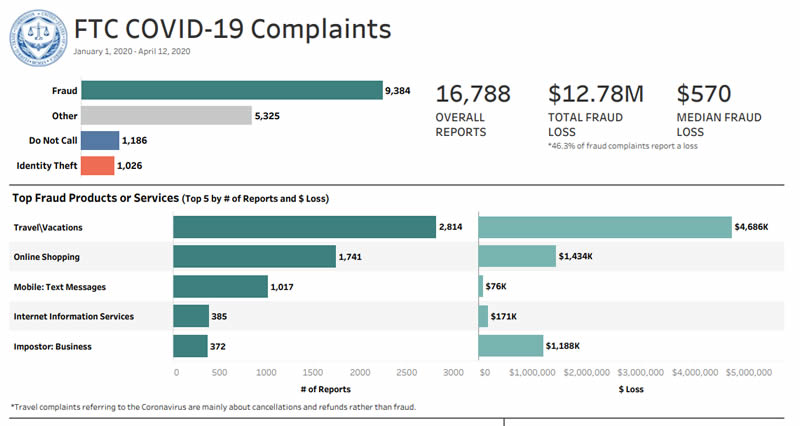Figures released by the U.S. Federal Trade Commission (FTC) have revealed the extent of losses to coronavirus and COVID-19 scams in 2020. The FTC received 16,778 reported complaints of consumer fraud in relation to the 2019 Novel Coronavirus between January 1, 2020 and April 12, 2020. Around 46% of those reported cases of fraud involved financial losses, which totaled $12.78 million during that period. The median loss was $570.
The COVID-19 related scams have been diverse, but the most common theme, by some distance, is scams related to travel and vacations. Many consumers have booked vacations, flights, and accommodation and have been looking for refunds. Scammers have taken advantage and have been conducting scams offering refunds and compensation. There were 2,814 reports of fraud related to travel and vacations, which resulted in losses of more than $4.86 million.
COVID-19 complains about fraud related to online shopping were also common, with 1,741 complaints and $1.43 million in losses. Cybercriminals have been taking advantage of the shortage of products due to increased demand and have been registering domains to sell fake products.
There were only 372 reported cases of fraud involving the impersonation of businesses, but those scams have proven to be very effective, with losses of $1.19 million.

Source: U.S. Federal Trade Commission
While many of these cases of fraud start with an email, there have been a growing number of cases of fraud via SMS messages and voice calls. There were 1,017 reported cases of fraud via mobile text message services (SMS, WhatsApp, Messenger etc.) with $76,000 in losses in the year to April 12, 2020.
In late March, the FTC issued a warning to VoIP service providers about the rise in attempted fraud via robocalls. 9 VoIP service providers were warned that the FTC had been made aware that some of their customers had been engaging in illegal telemarketing campaigns spreading disinformation and conducting scams. These campaigns exploited fears to elicit donations to fraudulent charities and to obtain sensitive information, attempted to convince consumers to purchase products such as warranties and protection plans, and calls offering help to reduce debt were also common.
While there have been many reports about the level of cybercrime increasing since the start of the Novel Coronavirus pandemic, figures from Microsoft and the US and UK governments suggest that the level of cybercriminal activity has not increased. What has happened is scammers have changed tactics, techniques, and procedures (TTPs) and are now taking advantage of COVID-19 and the conronavirus pandemic.
“Attackers don’t suddenly have more resources they’re diverting towards tricking users; instead they’re pivoting their existing infrastructure, like ransomware, phishing, and other malware delivery tools, to include COVID-19 keywords that get us to click,” said Microsoft 365 Security CVP, Rob Lefferts.
